Emphasizing Equity
contributed by Mary Clare Fischer
As oncology grapples with the country's legacy of systemic racism, the Rogel Cancer Center is leading multifaceted efforts to improve health outcomes.
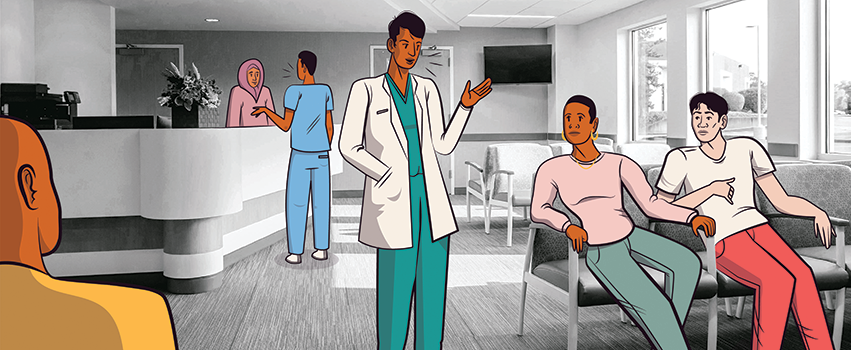
Every corner of Michigan Medicine clamors for Erika Newman's expertise.
As an associate professor, interim head of pediatric surgery, cancer scientist and diversity leader, her calendar is filled to the margins with meetings, research, surgeries and interviews.
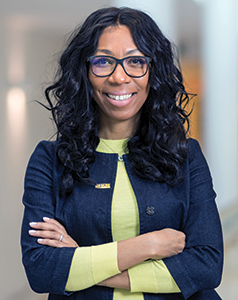
~Erika Newman, M.D.
So, when the University of Michigan Health Rogel Cancer Center was looking to fill a new position for associate director of diversity, equity, inclusion and justice, the cancer center's chief administrator, Julie Brabbs, was hesitant to ask Newman if she was interested.
But when Brabbs did, Newman knew she couldn't say no — not just because she was eminently qualified, having spearheaded diversity efforts for both the Department of Surgery and more broadly as the associate chief clinical officer for health equity for the U-M Medical Group. And not just because as a person of color, she and her family experience disparities every day. ("We were born into this," she says. "It's not like you have a choice.")
Mostly, Newman couldn’t turn down this opportunity because her mother needed more time.
Newman's mother was diagnosed with metastatic cancer as Newman was starting medical school. The two were best friends, she says, particularly close because Newman is an only child whose father was killed when she was 3 years old.
Yet their bond couldn’t save her mother, who died at age 45.
"What has been most painful to me is that I know she didn't have access to a cancer center like Rogel," Newman says. "She was being cared for in our local community hospital that was doing the best they could with limited resources. It was nothing like how patients are cared for here. And I wish my mom would have had an opportunity to come to a place like Rogel. It’s something I think about every single day."
"So, if I have an opportunity for us to improve access for patients that may not have an opportunity to get excellent care here," Newman says, "then I’m going to do that."
She's not the only Rogel Cancer Center leader who feels this way. Combating cancer disparities has been a longtime priority for Michigan’s highest ranked cancer center, well before events like the Black Lives Matter movement and the COVID-19 pandemic broadened the public consciousness of society’s systemic inequities.
"The entire leadership team is deeply involved and committed to intervening and reducing these disparities," says Ken Resnicow, Ph.D., Rogel's associate director for community outreach, engagement and health disparities, whose job description has included disparity research since he was first hired in 2003.
"And we try to promote it in every nook and cranny of the cancer center so people are aware, particularly of the key disparities across the state. Of course, we care about national numbers, but the emphasis is on taking care of our local communities."
Starting in 2017, the National Cancer Institute required NCI-designated cancer centers, including Rogel, to put additional resources toward the topic of disparities, with the promise of additional funding to support them.
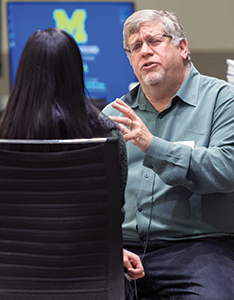
As a result, the cancer center has spent the past few years making even greater investments in everything from basic science research and health communications projects to community outreach and recruitment, all in the name of increasing equity in cancer care.
Although Newman was still outlining her long-term goals for her position at the time of the interview, she says the cancer center's comprehensive approach already lines up with the framework she uses to describe how she thinks about leadership.
"I have these L words I use," she says. "You start the journey by learning more."
'Learning more'
"Hello everyone, my name is Bob Dess," echoes a recorded voice. "I'm a radiation oncologist here at the University of Michigan, and it's my pleasure to speak to ASCO today on 'Prostate Cancer: Rejecting the biologic basis for outcomes disparities.'"
Robert Dess, M.D., is presenting at the American Society of Clinical Oncology's annual meeting, the world's largest cancer conference. A few years ago, he was the first author on one of the biggest studies to date to analyze outcomes associated with prostate cancer — a cancer that serves as a quintessential example of inequality.
From 2014 to 2018, Black people in the state of Michigan were 1.6 times as likely to be diagnosed with prostate cancer as whites and twice as likely to die from it, with similar numbers seen nationwide. Those who are Black also have higher rates of metastatic prostate cancer, and the odds are greater that they experience complications from treatment.
For a long time, the prevailing theory in the scientific community was that genetic differences were the source of different racial groups' propensity, or lack thereof, to not only develop chronic diseases like cancer but also to experience worse outcomes. Yet, as race has been increasingly recognized as a social construct, Rogel Cancer Center researchers like Dess are exploring the source of illness through a clearer lens ‐ one that considers the many societal, economic and environmental factors that play into whether a tumor grows and spreads within a human body.
For example, Dess and his team demonstrated that when Black and white patients with prostate cancer were given equal access to treatment, the disparities vanished — supporting the idea that the amount of melanin in your skin isn’t as relevant as the care you receive.
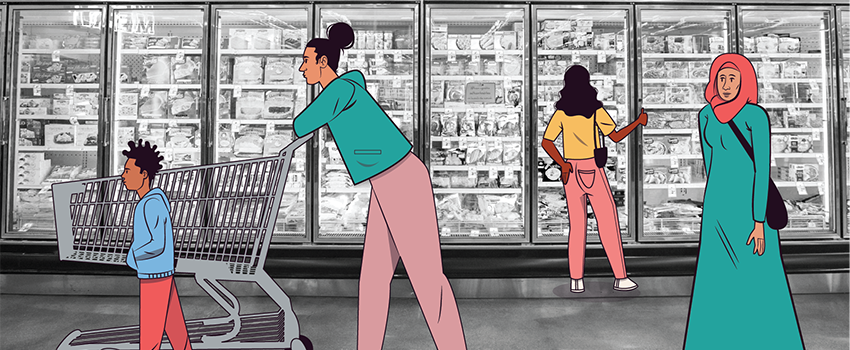
Elena Stoffel, M.D., M.P.H., a clinical associate professor of internal medicine/gastroenterology, and Laura Rozek, Ph.D., an associate professor of environmental health sciences, nutritional sciences and global public health, are interested in the origins of the problem: namely, how biological and environmental factors impact an individual’s risk for developing colorectal cancer.
About 1 in 10 colorectal cancers are diagnosed before age 50, and colorectal cancer cases have continued to increase. Incidence of colorectal cancer is higher among Black people compared to white people, with Black people more likely to develop cancer at younger ages.
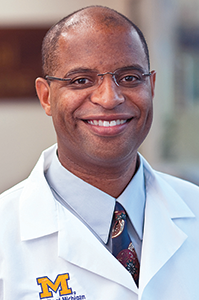
The pair is taking a multifaceted approach to examining racial disparities in colorectal cancer, teaming up with the Barbara Ann Karmanos Cancer Institute and Louisiana State University to recruit patients of different ethnicities diagnosed with colorectal cancer, and comparing the molecular makeup of tumors from patients who live in Michigan versus Louisiana.
"What we're recognizing is that not all colon cancers are the same and that identifying particular characteristics about each tumor may give us a better sense of how it developed and how best to treat it," Stoffel says. "And we're exploring whether there's something about potential differences in the way we live or differences in environmental factors, stress, or health behaviors that may impact the likelihood of developing a tumor and/or influence tumor behavior.
The hypothesis arrived at by John M. Carethers, M.D., is that inflammation in the gut microbiome triggered by certain diets is partially to blame for the racial disparity. Carethers, who chairs the Department of Internal Medicine, has for decades been studying how the breakdown of DNA repair mechanisms contributes to the development of cancer, and he recently received a grant from the National Institutes of Health to further explore one that seems to be affected by inflammation — and that is more common in Black people.
"We always say the high-fiber, low-fat diet or the Mediterranean diet is a good diet to lower the risk of colon cancer," Carethers says. "But whether you have access to that or not comes down to socioeconomics: Where do you live? What kind of grocery stores are near you? Are you in a grocery store desert — and if so, and that's the type of diet you have for 50, 60, 70 years, what kind of food products are you feeding into the microbiome?
"That could explain some of the disparity," he continues. "If you have the right inflammatory milieu mixed with the right genetic background, maybe that's why you're getting cancer."
When the grant is complete, he'll have more answers. But, for Carethers and many researchers at the cancer center, such study results represent not the end of a search, but really a new beginning.
"The challenge is always to figure out the primary drivers of the disparities," Dess says, "because if you understand primary drivers, then you can start thinking about solutions."
'Listening more'
Between May and September 2019, the shoppers at several Dearborn grocery stores encountered an unfamiliar sight: folding tables stocked with tablets, paper questionnaires and $25 gift cards. Each table was staffed by a representative from the Arab Community Center for Economic and Social Services, better known as ACCESS, a community-based health and mental health center for Arab Americans.
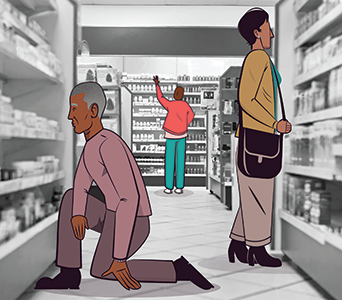
The Rogel Cancer Center had partnered with ACCESS to survey those who identify as Middle Eastern or North African (MENA) about their knowledge, attitudes, beliefs, barriers and behaviors. Since Southeast Michigan boasts one of the largest MENA populations in the United States, the cancer center sees many MENA people for treatment and has identified the community as a priority group to improve health.
But outreach and engagement is most successful when the person reaching out has a strong relationship with the person engaging. In many instances, the cancer center's community outreach and engagement team already has those connections. But ACCESS has spent half a century establishing trust with this particular community and knew what was necessary to make an impact with the MENA people: meeting them where they were.
So, backed by cancer center funds, ACCESS staffers and volunteers took to Arab-owned grocery stores, and colleges, and mosques. Their surveys asked questions about cancer screening — Where were people seeking cancer care? What were their perceptions of the different options available to them? — as well as about financial stress, barriers to care, discrimination, immigration status, and culturally specific risk factors like hookah smoking. Ultimately, they received responses from more than 400 people.
"We were able to identify a variety of barriers to optimal health for this population," says Minal Patel, Ph.D., M.P.H., an associate professor of health behavior and health education. "These raised questions around modesty issues and culture and religion that could lend to thinking about innovative ways of delivering culturally appropriate care."
Since then, studies led by Diane Harper, M.D., M.P.H., a professor of family medicine and of obstetrics and gynecology, examining at-home HPV screenings have intentionally included MENA individuals. (HPV testing is an effective method for cervical cancer screening partly because such a large proportion of cervical cancers are caused by the human papillomavirus.)
Preliminary data has shown that these DIY tests are more convenient and comfortable for the majority of participants, with multiple MENA women commenting that the tests were less embarrassing and preferred to a physician exam.
The disparities interventions haven’t stopped there. Resnicow has created a culturally tailored texting program in both English and Arabic to try to get tobacco use, both cigarettes and hookah, down in the MENA community. And Patel and Jennifer Griggs, M.D., M.P.H., a professor of hematology/oncology, are looking at ways to improve the financial burdens for cancer patients on a large scale.
Meanwhile, in partnership with the Michigan Oncology Quality Consortium, Resnicow, Griggs and Stoffel are seeking to improve care for Michiganders who have a genetic predisposition to cancer.
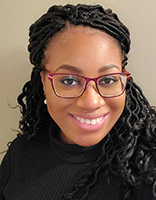
Clinical Trials are mosteffective when their samples represent patients who are diagnosed with cancer the most, but often they don't.
About 5% of clinical trial participants nationwide are Black, despite the higher incidence of most cancers in people of color.
"We need to know that those who are most affected by a disease are included in the testing of interventions," says Jamie Mitchell, Ph.D., M.S.W., the assistant director of clinical research participation at the cancer center, who’s working on a plethora of ways to diversify clinical trial recruitment.
Their clinical trial, funded by the National Cancer Institute’s Beau Biden Cancer Moonshot initiative, helps identify cancer patients who meet the criteria to be genetically tested for hereditary cancer syndromes.
Hereditary cancer syndromes are more common than previously thought and are associated with risks for many different types of cancer — yet the vast majority of patients who seek genetics services are white women worried about their risk for breast cancer.
Griggs started working with the design team that developed the family health history tool for the study more than a year ago to make it more inclusive or, as Erika Newman, who was recently named the Michael W. Mulholland, M.D., Ph.D. Research Professor, puts it, to "lower bias."
The first question it previously asked was whether patients knew their family members’ health histories or whether they were adopted. Those were the only two choices.
"There are a lot of families that don't have a mom, a dad and two kids," Griggs says. "There are surrogacies, and there are people who are estranged from their family of origin, and people who may not be in touch with one or another parent due to a multitude of reasons. So, we started looking at different options."
Other problems remained: If you are a woman, the only cancers you could pick from in your family history were associated with traditionally female reproductive organs. On the flip side, if you said that your brother had cancer, the choices didn’t include ovarian or endometrial cancer. Now that the researchers have revised the form, participants can note that familymembers of any gender have had any cancer.
"The goal was to reduce systematic harms done to non-binary and trans people as well as intersex people through questionnaires and surveys," Griggs says.
People who participate in the statewide project will be asked about their family history of cancer as well as their values, motivations and any concerns they might have about genetic testing. Based on their responses, patients who are eligible for genetic testing will receive tailored messages providing information about how to access genetic testing services and how the results could inform their care.
"We're finding out how we can decrease the barriers that we’ve put into place," says Griggs, who is also a professor of health management and policy. "It's not as if our patients don't know about the cancer in their family. Rather, we've failed to meet their needs. So now we're doing this through an equity lens and a 'closing the gap' lens that requires going to communities and creating trusting relationships."
'Leading with love and compassion'
When it was time for Lori Pierce, M.D., to cap off an extraordinary year as the first African American female president of ASCO, she knew where she wanted to give her final remarks.
Pierce, a professor of radiation oncology and vice provost of academic and faculty affairs across U-M, chose the Michigan League, a building that has sat at the north end of U-M’s central campus for almost 100 years. Its brick-and-stone facade, punctuated with stained glass windows, gives the appearance of an art deco-era high school mixed with a grand church — a gathering place for both education and community.
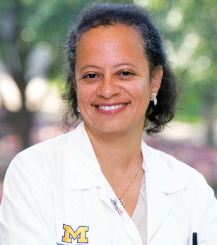
~Lori J. Pierce, M.D.
"The League was created in 1929 for women and by women as a place where they could congregate," Pierce intoned, flanked by the building’s ornate paneling, during ASCO's annual meeting. "And that was necessary because, up until 1956, women were not allowed in the main student union. It was exclusive to men unless women were escorted by a man, and then they had to use the side door."
"So, I thought the League would be a perfect location for me to open our annual meeting," Pierce added, "and to deliver my presidential address, which will focus on equity."
Pierce has become a standard-bearer for the issue as it relates to cancer care and research. As ASCO president, she didn’t simply describe the underrepresentation in health care that she’d personally witnessed visiting family in segregated North Carolina as a child. She invented and invested in solutions — like a fund for further research on disparities in cancer care, a podcast to educate providers about the impact of the social determinants of health and a collaboration with the Association of Community Cancer Centers to test strategies around increasing Black and Latinx participation in clinical trials.
It was ideal timing, as the national attention to endemic injustices grew and grew.
"It's having a cell phone to be able to videotape things in real time," she says. "Acts that have been going on for hundreds of years can now be brought to your television on the national news at 6 o’clock in the evening. It has evoked a feeling in the country and throughout the world that the status quo is not acceptable, and change has to come and has to come now."
And, at Rogel, change is coming now. It’s in the tweaks to forms that Jennifer Griggs has made to help people who have already been marginalized for so long feel recognized and accepted. It’s in the questions Ken Resnicow asks different cultural groups to encourage adoption of healthier behaviors. It’s in the grants that Debbie Chen has received to improve the health care experience for Americans who primarily speak a language other than English. And it is in Erika Newman's efforts to create a deep sense of belonging and anti-racism throughout the organization and the communities it is trying to better serve.
What is most important, though, is that the change continues.
"Equity work is not a one-and-done thing," Pierce says. "It's a constant, constant commitment. And that consistency in terms of commitment is what the community starts to see."
Continue reading the online version of Illuminate Winter 2022 issue:
- The Cancer Microbiome
- Found in Translation
- Perspectives with Max Wicha
- Bringing Harmony to Advanced Breast Cancer Care
- Let's Talk About How We Talk About Race
- Feedback Loops
- Probing a Cancer Paradox
Print/download the Winter, 2022 issue of ILLUMINATE.
Get research news in your inbox!
Our Illuminate e-newsletter showcases the important and unique research underway at the Rogel Cancer Center.
Follow this link and sign-up today!
